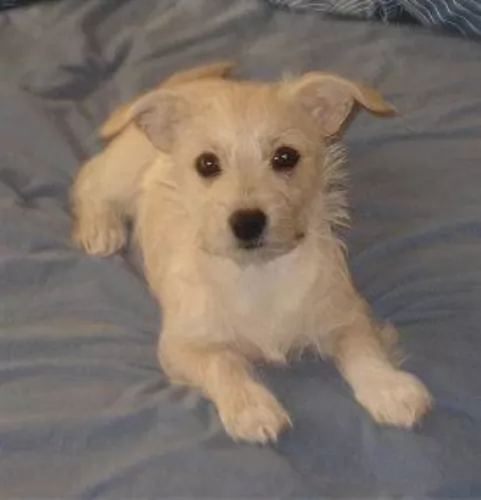 Petzlover
PetzloverBoth Canadian Pointer and Chipoo are originated from United States. Canadian Pointer may grow 38 cm / 15 inches higher than Chipoo. Canadian Pointer may weigh 18 kg / 40 pounds more than Chipoo. Both Canadian Pointer and Chipoo has almost same life span. Canadian Pointer may have more litter size than Chipoo. Both Canadian Pointer and Chipoo requires Low Maintenance.
There are some dog breeds whose history and origins are dubious. The existence of the Canadian Pointer is also a matter of debate, and research reveals very scanty information.
The dog seems to have been a gundog which originated in the United States. Another name for the dog is Adirondak Pointing Dog. The Canadian Pointer was developed from English Pointers, Labrador Retrievers and Portuguese Pointers during the 19th century. He was used for hunting and retrieving prey such as birds and rabbits.
 The Chipoo is not a purebred dog but rather a cross between the Toy Poodle and the Chihuahua. In the 1970’s the two breeds were crossed and the Chipoo was born. Chihuahuas have their origin in Mexico while the poodle is believed to come from Germany. This hybrid dog, because he comes form two purebred dogs is considered to be a designer dog. The Chipoo is not of course a purebred dog and is not recognized by the American kennel Club (AKC), but it is recognized by the designer groups and hybrid groups. These organizations include the International Designer Canine Registry, the American Canine Hybrid Club, the Designer Breed Registry, and the Designer Dogs Kennel Club.
The Chipoo is not a purebred dog but rather a cross between the Toy Poodle and the Chihuahua. In the 1970’s the two breeds were crossed and the Chipoo was born. Chihuahuas have their origin in Mexico while the poodle is believed to come from Germany. This hybrid dog, because he comes form two purebred dogs is considered to be a designer dog. The Chipoo is not of course a purebred dog and is not recognized by the American kennel Club (AKC), but it is recognized by the designer groups and hybrid groups. These organizations include the International Designer Canine Registry, the American Canine Hybrid Club, the Designer Breed Registry, and the Designer Dogs Kennel Club.
The Canadian Pointer makes for an excellent family pet. He is intelligent, excitable, loving and devoted, forming a strong bond with his human family. Active and excitable, it is this very energetic characteristic which will require him needing training and socialization. He is inclined to want to jump up against his family at the sheer joy of seeing them.
Although he loves country life, his love of human companionship allows him to adapt to city life and he is non-aggressive and can be a placid pet with children and other pets in the home.
The Canadian Pointer is a medium- to large sized breed of gundog. He has a lean, well muscled body with a short, coarse coat. The coat can be dark brown and white, black and white or a fawn color and white. The coat can also be freckled in parts.
He is a gundog belonging to the HPR group. HPR stands for hunting, pointing and retrieving. Weighing roughly 22–27kg, he stands about 56 – 76cm in height. Sometimes the tail is docked but otherwise it is left so that it’s medium length and is held straight out and level with the body. The ears of the Canadian Pointer are fairly short and floppy.
 The Chipoo varies greatly in looks depending upon which breed it got most of its characteristics from. It is a toy dog, but it can have a curly coat or a straight one. It can be fluffy or wiry. It can be just about any color. All of them have Chihuahua tails but again depending on the mix, they can look like poodles or they can look like chihuahuas. They can vary in size from a very small toy to a larger sized small dog. You can have two Chipoos from the same litter and they will not be recognizable as littermates. However, they will all be adorable.
The Chipoo varies greatly in looks depending upon which breed it got most of its characteristics from. It is a toy dog, but it can have a curly coat or a straight one. It can be fluffy or wiry. It can be just about any color. All of them have Chihuahua tails but again depending on the mix, they can look like poodles or they can look like chihuahuas. They can vary in size from a very small toy to a larger sized small dog. You can have two Chipoos from the same litter and they will not be recognizable as littermates. However, they will all be adorable.
The Canadian Pointer is a dog who thrives on hard work and they are strong-willed, confident and boisterous but never aggressive. They’re intelligent and alert and respond well to training and socialization. Once trained he works hard to please his owner.
The Canadian Pointer is independent and can be aloof around strangers, but he just loves his human family and makes every effort to please them and be around them whenever he can. Treat him properly and he will give you endless hours of enjoyment and companionship.
Pointer dogs are looked upon as a healthy breed, but having said that, they aren’t immune to illness, and there are some common dog diseases that you should be aware of -
This disease is caused by a malformation of the hip joint. This ailment can result in pain and discomfort for your pet as well as arthritis and even lameness. Unfortunately there is no cure but the vet can do a lot to make life more comfortable for your pet.
This is a genetic eye disease where your pet gradually loses vision. The retina deteriorates and stops functioning.
 Hybrid dogs often do better health wise than the original parents, but this is not true of 2nd and third generation crosses. However, this is not generally true of the Chipoo, as they are no longer bred poodle to chihuahua but rather Chipoo to Chipoo. They are basically healthy but face some issues such as:
Hybrid dogs often do better health wise than the original parents, but this is not true of 2nd and third generation crosses. However, this is not generally true of the Chipoo, as they are no longer bred poodle to chihuahua but rather Chipoo to Chipoo. They are basically healthy but face some issues such as:
This is what causes the tear stains on most small light-colored dogs. This is called Epiphora and is not an irritation in the eye, just overly active glands.
This is low blood sugar and can cause all kinds of problems for your Chipoo. This can be fatal if not cared for. It has many causes if the dog is not diabetic including Xylitol (sugar free gum and other) parasites, stress, diarrhea or bacteria.
This loose knee cap condition is found in many small breeds and can lead to arthritis and lameness.
The Canadian Pointer was specifically developed to be a hunter so he is an energetic dog. When it comes to caring for him, training and socialization can make him an even more amicable pet. He is muscled and lithe and you want to keep him that way by ensuring he is well exercised.
Take him on walks, into the park with ball and frisbee or let him run while you cycle. Don’t leave him without exercise as he can become frustrated and ill.
The Canadian Pointer is a low maintenance breed with his short coat. You’ll need to give his coat a good brushing twice a week to rid him of loose hairs to keep the hair shiny and healthy.
Dogs like the Canadian Pointer with floppy ears will need to have their ears checked for infections to avoid hearing loss. You’ll see your dog shake his head, the inside of his ears may be red and he could have a moist discharge.
Remember that yeast and bacteria are problems with floppy-eared dog breeds and you’ll need to ensure that the ears are cleaned and kept dry. Be careful if you don’t know how to do it, and get advice from your veterinarian on how to attend to the ears of your dog.
 Because they are prone to hypoglycemia, make sure you feed a high quality dry food and break it up into three or four small meals a day in order to maintain the blood sugar and avoid the drops and spikes that can cause them serious health issues.
Because they are prone to hypoglycemia, make sure you feed a high quality dry food and break it up into three or four small meals a day in order to maintain the blood sugar and avoid the drops and spikes that can cause them serious health issues.
This is common in the Chipoo and it makes it hard for the dog to absorb things through the skin such as topical ointments for ticks and flea prevention.
If the outside temperature is less than 50’, then your Chipoo needs to wear a sweater as they get cold very easily.
The Chipoo is an energetic little dog and he loves to go on walks, play in the yard and be with the family. Both the Chihuahua and the Poodle are very intelligent dogs and so this cross gets bored and destructive if not stimulated enough. He’ll be great at agility and obedience. Like the poodle you can teach him a lot of tricks.